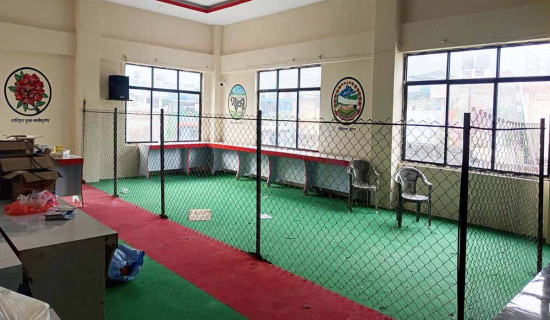- Tuesday, 3 March 2026
Persons With Disabilities Need Recognition
Persons with disabilities (PWDs) are part of society. So they are not outcastes. That is why they should be treated on a par with other members of society. Every country has PWDs. Disabilities can be classified into different categories: physical disability, visual impairment, hearing impairment, hearing and visual impairment, speech impairment, mental disability (intellectual disability, mental illness, psychosocial disorder and autism) and multiple disabilities. According to the 2021 Census of Nepal, 2.2 per cent of the total population has some form of disability. This means around 648,000 people have some form of disability.
Among the male population, 2.5 per cent has disability as against 2 per cent among the female population. However, according to the Nepal Population and Health Survey, 2022, 6.7 per cent of the total population has some form of disability. A survey by the Sharecast Initiative Nepal also put the figure at 6.7 per cent. Out of all the PWDs, 60 per cent live in urban areas, whereas only 40 per cent live in rural areas. This is because rural PWDs migrate to urban areas like Kathmandu as there are very good disabled-friendly services available vis-à-vis in rural areas. As such, Bagmati province has the highest number of PWDs at 4.5 per cent.
Legal mechanisms
Nepal has given priority to PWDs since the 1980s through legal mechanisms. In 1982, the government enacted the Disabled Protection and Welfare Act after the proclamation by the United Nations of the International Year of Disabled Persons in 1981. Thereafter, the government enforced the National Policy and Plan of Action on Disability. In 1992, a series of legislations was adopted such as the Education Act, 1992, the Child Rights Act, 1992 and the Local Self-Government Act, 1999. In 1994, the Disabled Protection and Welfare Regulations were formulated. Nepal signed the Convention on the Rights of Persons with Disabilities (CRPD) and the Optional Protocol to the CRPD in 2008 and ratified them in 2009. Similarly, the government enacted the Act on the Rights of Persons with Disabilities in 2017.
The Constitution of Nepal, 2015 guarantees various types of freedoms and human rights to all citizens. According to the Constitution, all three tiers of government are responsible for the welfare and care of PWDs. Further, the Constitution protects the rights of PWDs to political representation at all three levels of government. As PWDs are a vulnerable group, the government has taken some steps to promote their interests. It is the duty of the state to take measures to eliminate all kinds of discrimination against PWDs.
In fact, after the Maoist insurgency came to an end in 2006, the government gave priority to social inclusion and the recognition of human rights, including those of PWDs. Accordingly, the government announced the most comprehensive policy document. The document was concerning positive discrimination designed to give more privileges to PWDs so that they could live a dignified life without being disparaged or stigmatised by society. The government also announced quotas for PWDs in training programmes conducted by government organisations and employment in government agencies and private organisations that would hire over 25 employees.
Since 2064 BS, the Public Service Commission has followed the principle of inclusion in recruiting PWDs into the Civil Service on the basis of the quota assigned to them. As a result, the number of PWDs serving in the Civil Service is gradually rising. Likewise, in 2071 BS, the government, through an amendment to the National Building Code, 2060 BS, enforced construction standards to make public buildings and other structures disabled-friendly. But public buildings are yet to be fully disabled-friendly. Concessions and seat reservations were proposed in public transport for PWDs. Inclusive education was proposed to provide free education for PWDs and make the buildings of educational institutions disabled-friendly.
In a similar vein, a proposal was made to provide free basic health services for PWDs at government hospitals and other health centres. Now, there is a provision of disability allowances in Nepal. But not all PWDs are eligible for such allowances. Only those belonging to A and B categories (total and severe disability) are getting the allowances, while those in C and D categories (moderate and mild disability) are deprived of the facilities.
Disability is often considered a family matter in Nepal. It is also seen as a curse from one’s previous life. Actually, disability may be caused by birth defects (congenital condition), malnutrition or disease. It is said that a balanced diet may prevent one-third of disability cases. Some forms of disability can be cured but lack of specialist medical treatment or resources at medical facilities needs to be overcome. Moreover, prejudices against PWDs exist in society owing to caste systems, gender inequality, religious beliefs and ethnic norms.
Disabled-friendly structures
Nepal has three tiers of government. Local bodies are entrusted with adequate authority to initiate development and other works and manage social security allowances. So they need to give priority to the issues regarding PWDs. For this, enough budgets should be allocated for the initiation of pro-PWD projects. Such budgets can be utilised to erect disabled-friendly structures such as pavements, toilets and lifts. PWDs are a marginalised group. Whenever there arise calamities or emergencies, they are hard hit.
The 2015 earthquakes and the COVID-19 pandemic are a case in point. Further, PWDs are being disproportionately impacted by climate change. So the government should take concrete measures for the benefit of PWDs. The government should arrange for the free medical treatment of disability. Some forms of disability can be cured but the victims may be deprived of getting treated owing to financial constraints. Such treatment may be included in social security schemes. After all, PWDs have the same rights and privileges as normal people have.
(Maharjan has been regularly writing on contemporary issues for this daily since 2000.)
















